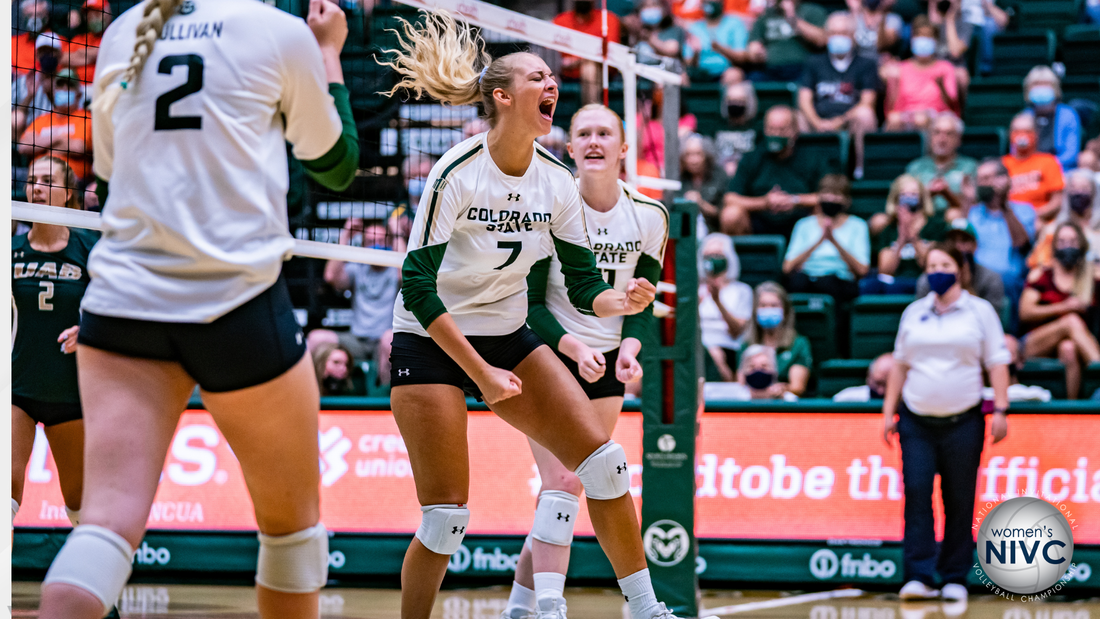|
by Kyle Koso
In the world of college volleyball, you don’t accrue sky-high numbers of victories and NCAA Tournament appearances without having your feet on the ground. Having a grip on reality is what keeps rosters excelling over time, and that’s been the approach for Tom Hilbert during his 25-year run at Colorado State. In 23 of his 24 non-COVID seasons Hilbert has directed the Rams to the NCAA postseason (to go with 12 Coach of the Year awards in the Mountain West Conference), but this year CSU came up short, for a variety of reasons. With the return of the National Invitational Volleyball Championship, Hilbert and his staff figured it was better to keep the team in a competitor mindset, rather than lament what could have been. So the Rams (18-10) agreed to join the 31-team field; hosting a regional this week that starts Thursday with Tulsa (14-15) playing UTEP (21-7) before CSU takes on Houston Baptist (21-8). “We felt like as inexperienced as the team is, and that we return everyone but two defensive players, we felt like having a postseason experience would be good for us, to learn how to play the duration the season, 15-16 weeks,” said Hilbert, who has 791 career victories, 10th all-time in the NCAA and sixth for D-1. “That is important; a lot of teams burn out. I’ve talked to teams in the conference who aren’t playing in the NIVC because the team is done … we wanted to play it and stretch them out. We got them excited about the idea two weeks before we even decided we were going in. I think it’s a good thing for us to do in this moment and time.” Colorado State fully understands, this was still a successful season. The team tied for first for the MW regular season title and saw Annie Sullivan, a transfer from High Point, earn league Newcomer of the Year honors. Four players (Kennedy Stanford, Alexa Roumeliotis, Ciera Pritchard and Karina Leber) were all-MW selections; the team also was the No. 1 seed at the MW Tournament in Las Vegas. But road matches were a wobbly topic this season, as CSU simply struggled to minimize the lows and build upon the highs. Colorado State was upset by host UNLV at the tourney, and when Boise State ended up winning it all as the sixth seed, the NCAA tournament took only the Broncos out of the MW. “We relied on the fact that at home, especially, we played really clean in the serve-and-passing game. When that didn’t happen on the road, our attackers were young enough, they could be disrupted,” Hilbert said. “And when they were, it caused problems for us. There were inconsistencies, tentativeness, when you got into end-game situations with some our players on the road. “That’s normal for a group as inexperienced as we were; we may have some older players, but we only had one player who had ever started games before COVID. I was real proud how we played and especially how we played at home. And we had couple real nice road wins (Boise State, San Diego State, where the Rams trailed 2-0 before rallying). We did some fun things and learned a lot.” If the postseason push through the NIVC and their own personal growth play out right, the Rams are ready to flex in seasons to come. Stanford, a sophomore, leads the team with 330 kills with Sullivan next 279. Leber, a 6-foot-3 sophomore middle, added 233 kills. “We’ve tried to keep it simple. We do scheme a lot of blocking, but I guess it’s not working because we’re not as near as good as we have been in the past,” Hilbert said with a laugh. “We are good defensively, we get our hands in front of people and we create problems … we are bringing them along. But we keep it simple, simple but fast, and it’s working to a degree.” Sullivan and Stanford had new and important roles for CSU; they were going to be leaned on heavily, and there really wasn’t much debate about the scale of Hilbert’s expectations. “Both went through times this year where one was good and one was bad, then it would switch. And we had matches where they were both good. They are both fighters,” Hilbert said. “Kennedy, especially, we’ve taught that even if you are down and not having a good match, you have to go up and take swings. If it doesn’t work, it’s our fault as coaches. You have to be aggressive. Annie, she’s always aggressive. She (gets blocked) unfortunately at times because of that aggressiveness, but she goes out and fights. She has a motor like no one else. I like both those kids on the outside position, and they’ll only get better.” Keeping it all humming in the right direction is Pritchard, in her second year as the team’s primary setter and who has rung up 1,008 assists this year, at 9.88 per set. Her moment to sparkle, however, had to wait until the shining example of Katie Oleksak finally receded from the court — Oleksak was the first player to be named MW Player of the Year three times, was a four-time AVCA honorable mention all-American and is the CSU leader in assists for the modern era. “If you know Ciera, she is very, very high energy, opinionated and a strong personality - it was difficult for her to play behind Katie Oleksak even though the whole world knew Katie was a great player,” Hilbert said. “Ciera, coming into 2020, was ready to take over, and then she went through a phase where she realized it wasn’t going to be as easy as she thought it was. She had some ups and downs. “But of all her traits, she is a great decision maker, and she is great competitor. She will go out and figure out how to win, and make decisions on the court as well as any setter I’ve ever had.” HOUSTON BAPTIST -- Colorado State’s opponent is in the postseason for the first time since the program returned to D-I status in 2007. HBU has seven players with 100 or more kills; setter Ellie Wipf has 1,014 assists (9.66 per set). The Huskies saw Wipf, Ebonie Ballesteros and Anna Gadway earn all-Southland Conference first-team honors, and Trent Herman (10 years, 169-137 overall at HBU) was named as the league’s coach the year. |
Archives
December 2023
|


 RSS Feed
RSS Feed